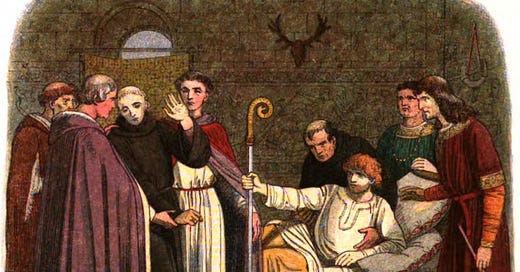LFINO: Issue #6 - Reading The Recognitions - Chapter 5 BONUS ESSAY:
Note on the text: This reading of The Recognitions will be using the 2020 New York Review Classics (NYRB) edition of the text. All page number references will refer to this edition. The recommended way to approach this blog is to read the chapter yourself, first, and then come back and read this. Of course you may read it however you like, but I will be starting with a synopsis which will inevitably contain spoilers. This is not intended as a replacement for Steven Moore’s (brilliant) annotations, but as another tool to help unlock this difficult book, and to further add to the discussion of William Gaddis’s work. For specific references, please consult https://www.williamgaddis.org/recognitions/I1anno1.shtml
As I had mentioned in the free essay for this fifth chapter, I had originally planned for that work to have been a character introduction sheet, of sorts, before I’d gotten overexcited and dedicated the entire piece to Otto. Whilst I had initially planned for this bonus essay to be dedicated solely to Anselm, I have decided to use this as an opportunity to get a better sense of who the key players are in this scene and beyond more generally. As the idea of the village party is one the novel will continue to return to, at least throughout the second volume, the reader needs to be aware of the dynamics at play in this environment. I haven’t arranged the characters in any order of significance beyond simply there being more to say about some than others.
Anselm:
Anselm (real name: Arthur), in some ways, is the third piece of the puzzle of male characters which includes Wyatt and Otto. He is another of the chapter’s many poets but one who has drifted into being this drunken mystic, fire and brimstone prophet of doom. While not the most important detail to note, the observant reader will notice that we have met Anselm very briefly in chapter three, where he is name-dropped as a drunk at the bar at New Years. He enters this chapter as a somewhat frightening lurking figure. ‘Aware of an unshaven face over his shoulder […] and did not turn until the unshaven boy, not included in the conversation, went away rubbing a badly blemished chin. - Who was that? -He’s a drunk, Hannah said, - his name is Anselm. He gets screwed up with religion.’ (180) What appears significant in this introduction is that Anselm is referred to as a ‘boy’ which puts him in relation to Otto (who we know is similarly referred to as such). The comments on his acne and the poor state of his facial hair similarly draws him into comparison with Otto, who we know has put a tremendous amount of consideration into his outward appearance, particularly his new moustache. The contrasting point is in the fact that he is not at all concerned with how he presents outwardly. He drinks, staggers, makes others uncomfortable, and drifts into tirades. Most significantly, perhaps, is that he directly challenges Wyatt rather than merely ignoring him as everyone else does.




